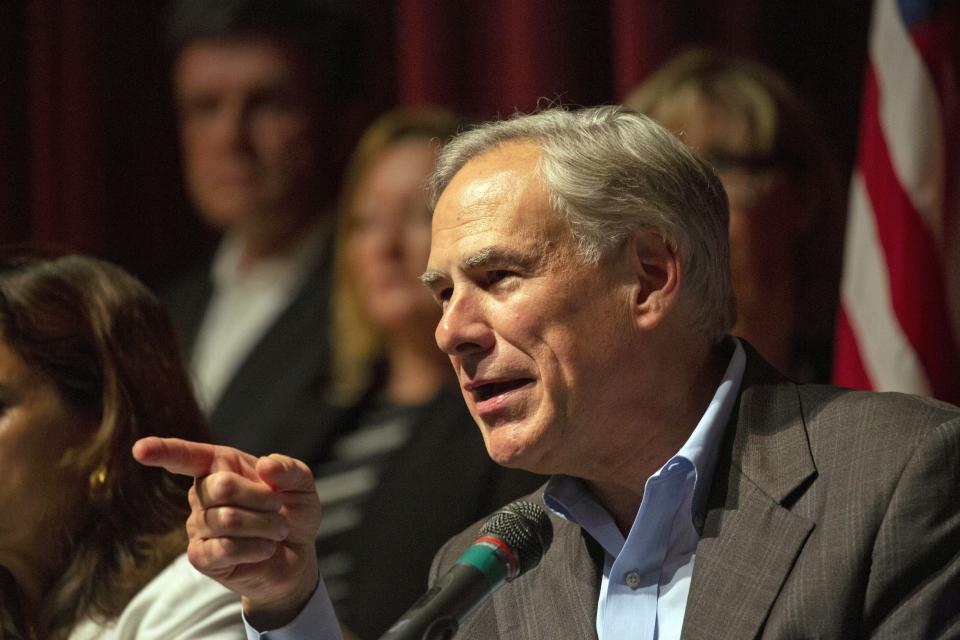Opinion: Abbott’s misguided effort to weaponize the leaked draft on abortion
- Oops!Something went wrong.Please try again later.
Based upon the reasoning of the leaked opinion in Dobbs v. Jackson Women’s Health Organization, which would overturn Roe v. Wade, activists on all sides have predicted that the final decision (if it follows the draft) could threaten other precedents protecting civil rights and liberties. Indeed, at least one elected leader wasted no time in announcing the next target: just two days after the disclosure of the draft opinion, Governor Greg Abbott told a radio host that he hoped to challenge a 1982 decision, Plyler v. Doe, in which the Supreme Court struck down a Texas law authorizing the differential treatment of undocumented children in public education funding.
It’s not clear how much thought the governor gave any plan to overturn Plyler, but should Texas again seek to exclude undocumented children from public education funding, the new law is also likely to be deemed unconstitutional.

To see why requires some understanding of the draft opinion in Dobbs. In Roe, the high court held that a woman’s right to choose has its basis in the constitutional protection of something called “substantive due process.” Unlike the procedural protections typically associated with due process, substantive due process protects certain individual autonomy interests not specifically named in the constitution from interference by the state, unless the state has particularly compelling grounds to regulate those interests.
Prior to and in the years following Roe, the court found other interests to be fundamental under substantive due process, such as the right of parents to decide whether to have a child, and the right to decide how children will be raised and educated. If, as the draft opinion in Dobbs suggests, the constitution does not protect a woman’s right to choose, it can be argued that other fundamental interests under substantive due process should be fair game for governmental regulation.
The problem with the governor’s proposal is that public education has never been regarded as a fundamental interest under substantive due process, as the court concluded in another Texas case, San Antonio Independent School District v. Rodriguez.
When the court in Plyler v. Doe held that Texas could not exclude undocumented children from the benefits of a public education, it did so based not on substantive due process but equal protection—the constitutional commitment to equal treatment of similarly-situated groups. Given that undocumented children are not responsible for their citizenship status, the court reasoned that Texas had not articulated a substantial reason why they should be treated differently than other school-aged children eligible for the benefits of public education.
In fact, one of the arguments Texas relied on in Plyler was the cost of educating undocumented students—the basis for Governor Abbott’s play to have the decision overturned. Forty years ago, the court noted that, so far as educational cost and need are concerned, “undocumented children are basically indistinguishable from legally resident alien children.” Texas would have the burden to show that this is no longer true—and, however many more undocumented children might reside in Texas today than did in 1982, it is unlikely that the proportion is so much greater now that the only means by which the state could reduce education costs would be denying these children access to public schools.
The governor’s aim appears to be securing federal funding for the education of undocumented children. That, of course, is a policy determination for federal lawmakers. Regardless whether the governor will be able to prevail upon them, the draft opinion in Dobbs does not undermine the court’s decision in Plyler. It is no less true today than when the court resolved that case that a state law denying undocumented children a public education essentially serves to punish them for circumstances well beyond their control.
Friedman teaches constitutional law at New England Law | Boston and is the author of Modern Constitutional Law. His op-ed was submitted exclusively to the Statesman.
This article originally appeared on Austin American-Statesman: Opinion: Abbott’s misguided effort to weaponize the leaked draft on abortion

